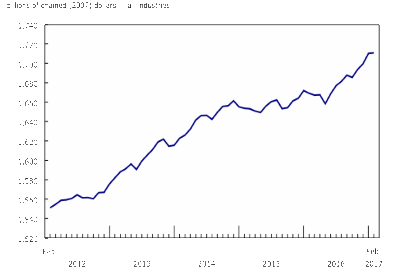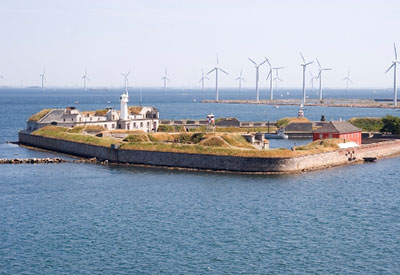February GDP: Construction Up, Manufacturing and Utility Sectors Down

Gross domestic product was unchanged in February following three months of growth. Gains in service-producing industries were offset by declines in goods-producing industries.
Service-producing industries were up 0.2% in February following a 0.5% gain in January, the highest monthly growth rate since January 2013. Goods-producing industries were down for the first time since October, declining 0.3% in February.
The utilities sector contracted 0.2% as the output of electric power generation, transmission and distribution and natural gas distribution declined.
Construction continues to grow
Construction increased for the fourth month in a row, rising 0.5% in February. Engineering and other construction activities increased 0.9% and repair construction grew 0.8%. Residential construction was up 0.3% due in part to more double and row housing construction. Non-residential construction was down 0.5% as industrial, public and commercial construction declined.
The manufacturing sector declines
The manufacturing sector declined 0.6% in February after growing in seven of the previous eight months. The majority of subsectors declined across both durable and non-durable manufacturing.
Durable manufacturing contracted 0.6%, led by lower wood product (-4.5%), transportation equipment (-1.6%) and miscellaneous (-5.0%) manufacturing. In contrast, fabricated metal product (+5.7%) and primary metal (+1.0%) manufacturing increased.
Non-durable manufacturing fell 0.7%, led by decreases in plastic and rubber (-4.3%), chemical (-1.5%) and paper (-1.4%) products. Beverage and tobacco (+3.2%) and food (+0.6%) manufacturing increased.
The real estate and rental and leasing, finance and insurance sectors both grow
The real estate and rental and leasing sector grew 0.5% in February, led by a 5.3% gain in output of real estate agents and brokers, mainly as a result of notable gains in activity in and around the Greater Toronto Area.
The finance and insurance sector was up for the fourth month in a row, rising 0.7% in February. Depository credit intermediation and monetary authorities were up 0.5%. Financial investment services, funds and other financial vehicles increased 1.4% from higher mutual fund activity related in part to the March 1 deadline for Registered Retirement Savings Plan contributions for the 2016 tax year. Insurance carriers and related activities advanced 0.7%.
Increases in both the real estate and rental and leasing, and finance and insurance sectors contributed to a 2.9% rise in the output of legal services, which was the main contributor to the 0.5% increase in professional, scientific and technical services.
Mining, quarrying, and oil and gas extraction declines
Mining, quarrying, and oil and gas extraction declined 0.2% in February after growing 2.2% the previous month.
Oil and gas extraction was unchanged in February as lower conventional oil and gas extraction was offset by a gain in non-conventional oil extraction.
Mining and quarrying excluding oil and gas extraction decreased 3.6% in February after four consecutive monthly gains. Metal ore mining declined 2.1%, led by lower activity in copper, nickel, lead and zinc extraction. Non-metallic mineral (-5.6%) and coal (-6.6%) mining also declined. The volume of exports of metal ores and non-metallic minerals was down in February.
Support activities for mining, oil and gas expanded 4.8% in February, continuing a growth sequence that began in the third quarter of 2016 following a slump that began in early 2015.
Wholesale trade declines
Following a 2.1% gain in January, wholesale trade declined 0.4% in February. Seven of nine subsectors recorded losses, while farm product and machinery, equipment and supplies wholesalers increased.
Retail trade is unchanged
The retail sector was unchanged in February after expanding 1.5% in January. Overall, seven of twelve subsectors increased, led by health and personal care stores, clothing and clothing accessories stores and general merchandise stores. Motor vehicle and parts dealers, building material and garden equipment and supplies dealers, and food and beverage stores also recorded declines.
Transportation and warehousing declines
Transportation and warehousing was down 0.3% in February. Rail transportation declined 2.3% as movement of coal, grain and fertilizer products (such as canola and potash), forest products and intermodal freight were all down.
Other industries
Agriculture, forestry, fishing and hunting was down for the fourth time in five months, declining 1.2% in February.
Accommodation and food services were unchanged in February. The increase in food services and drinking places was offset by the drop in accommodation services, which declined for the fifth time in six months.
The public sector (education, health care and public administration) was essentially unchanged.
Source: Statistics Canada, www.statcan.gc.ca/daily-quotidien/170428/dq170428a-eng.htm.










